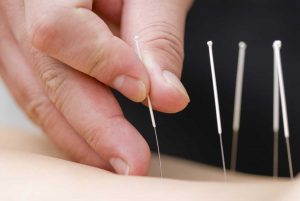In biomedical terms, acupuncture is a needling technique that restores internal homeostasis. As Christian Nix and Paul Raford state, acupuncture accomplishes this by “down-regulating a hyperactive sympathetic nervous system, thus disrupting and modulating the stress response”.
A hyperactive system has a number of adverse effects, such as:
- Increased blood pressure and heart rate
- Increased emotional and physical stress
- Decreased heart rate variability
- Decreased blood flow to digestive organs and soft tissue
- Impaired cognition from irregular sleep
In turn, down-regulating a hyperactive system can help:
- Reduce blood pressure and heart rate
- Increase blood flow and repair muscles
- Reduce emotional and physical stress
- Fight the symptoms of depression and anxiety
- Promote overall feelings of wellness
- Improve sleep patterns
Acupuncture also stimulates nerves to release a number of chemicals that can aid in muscle repair, pain relief, stress relief, and an overall sense of wellbeing.
How acupuncture repairs muscles
One way the body responds to acupuncture involves a process of nerve stimulation known as “axon reflex”. Acupuncture needles are used to stimulate the skin and muscles, which causes chemicals, such as calcitonin gene related peptide (CGRP) and ATP, to be released. Because CGRP is a vasodilator, this chemical dilates blood vessels, thereby increasing oxygen-rich blood flow to the immediate area. In turn, this fuels tissue and muscle repair, and effectively helps aid in the recovery of musculoskeletal conditions.
Acupuncture and pain relief
Acupuncture can help relieve pain by blocking pain messages through a process referred to as the ‘segmental effect’. By gently stimulating specific points on the body, acupuncture triggers nerve signals to a portion of the spinal cord called the dorsal horn. This causes local cells to release the body’s own pain-suppressing mechanisms, such as a chemical called encephalin, which blocks further stimulation of the nerve. Since nerves supply large portions of the body, such as organs and muscles, blocked stimulation of one nerve will help block pain messages coming from a much wider area of the body.
Acupuncture for stress, anxiety, and depression
Nerve stimulation occurring through acupuncture will also propagate up from the spinal cord and into the brain. This influences many portions of the brain, including the limbic system, or the emotional center of the brain, thereby enhancing production of ‘feel good’ hormones such as adrenocorticotropic hormone (ACTH), endorphins, oxytocin, serotonin, and norepinephrine.
The release of endorphins and oxytocin may be an important component as to why many patients describe their experience as sedating, calming, and relaxing.
Acupuncture not only regulates body’s stress response but may also fundamentally recalibrate aspects of the primary Central Nervous System responsible for symptoms and severity of anxiety and depression.
References:
www.acupuncturetoday.com/mpacms/at/article.php?id=32905
